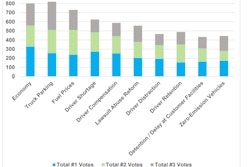The new task force of trucking experts that the Federal Motor Carrier Safety Administration formed to address predatory truck-leasing tactics deployed by some motor carriers against truckers held its second meeting on Oct. 17.
The nearly daylong virtual meeting explored how the Truck Leasing Task Force (TLTF) will define predatory lease-purchase agreements between carriers and their employee drivers or owner-operators and what regulations could be promulgated to prevent these agreements from causing financial harm in the first place. Also discussed: how to educate victims on ways to seek recompense without incurring further debt.
Atop the agenda for the task force is completing FMCSA Task 23-2 by reviewing and sharing “common” truck leasing agreements and discussing the ways by which “some providers of such agreements create inequity through inappropriate terms or conditions.”
TLTF deliberated on this task at its October 17 meeting and allowed for continued discussion at subsequent meetings. The results of this and other tasks will be compiled and submitted to FMCSA’s Administrator as recommendations in a comprehensive report by Nov. 16, 2024. The agency will review this final report and submit it to the Secretaries of Transportation and Labor as well as to the appropriate congressional committees.

The nine members of TLTF are drawn from motor carriers, owner-operators, labor unions, consumer protection groups, other related businesses, and attorneys:
- Tamara Brock, Brock Logistics, LLC and Lewis & Lewis Logistics, LLC (independent owner-operator)
- Paul Cullen, The Cullen Law Firm, PLLC (attorney)
- Troy Hawkins, TTOH Consulting & Logistics, LLC (independent owner-operator)
- Jim Jefferson, Owner-Operator Independent Driver Association
- Joshua Krause, OTR Leasing, LLC
- Kaitlyn Long, International Brotherhood of Teamsters
- Steve Rush, Carbon Express Inc.
- Lesley Tse, Animal Defense Partnership, Inc. (attorney)
- Steve Viscelli, Ph.D., University of Pennsylvania (economic sociologist)
Long time coming
The work to establish the task force began in 2022, as a cooperative effort of the Department of Transportation and the Department of Labor. But the problem that the group is charged with tackling dates to at least the 1960s, said task force member Steve Rush during the first meeting.
The meeting got under way with a presentation by Emma Oppenheim, Senior Fellow for Workers Initiatives of the Consumer Financial Protection Bureau (CFPB), that pinpointed the negative results that wrack up for truckers when they are denied the “ability to repay debt that is controlled by the issuer of the debt itself.”
The core of the meeting was the group’s initial discussion of its Task 23-2 remit to examine “Common Truck Leasing Agreements to Commercial Motor Vehicle (CMV) Drivers and the Existence of Inequitable Leasing Agreements and Terms in the Motor Carrier Industry.”
Consensus emerged among the task force members to focus first on addressing three key matters:
- Reviewing lease-purchase agreements that are typical of predatory actors and those of “good actors” that present drivers with fair agreements, which are financially sound for them to sign. The goal here being to reveal how some providers of equipment via lease-purchase create inequity for the driver by use of inappropriate terms and conditions.
- Considering establishing guidelines in a “buyer-beware format” to educate drivers about the risks of entering a lease-purchase agreement. FMCSA Associate Administrator for Policy Larry Minor suggested that this information might be presented as a flow chart, illustrating what issues may pop up as a driver moves through reading a lease-purchase plan to ensure he or she will better grasp what they may be signing and what financial risks they may face. Minor also made the point that such a document could be created and disseminated much more quickly than a federal rulemaking. In that way, it would offer some protection to drivers as a protective federal rule is proposed and eventually issued.
- Discussing how to structure a lease-purchase contract that will permit the truck purchaser to gain equity and allow the driver to take their tractor to another motor carrier before the lease terms are met. Part and parcel to this is what’s at the heart of predatory leasing practices: the “intertwining” of driver compensation and lease payments so that both are handled by the motor carrier or its in-house lessor. Hence, drivers cannot break the vise-like grip of the lessor that holds all the cards.
Attorney Paul Cullen, of The Cullen Law Firm, observed that “overwhelmingly, the problem [of predatory leasing is driven by] the lack of definable terms. There may be a perfect looking agreement; everything looks to be on the up and up. But there may be missing terms — a lack of disclosure to the driver.” Then, when a driver needs to provide an attorney with a complete loan statement, the motor carrier may terminate them for some bogus reason: “One driver seeking an accounting was fired for supposedly damaging a trailer.”
Impact on new drivers
Steve Viscelli, economic sociologist at the University of Pennsylvania, made the case that changing driver demographics is worsening this impact. He said that over the years that he’s interviewed drivers about these plans, a higher percentage of them are now recent immigrants who are not proficient enough in English to wade through legalese. “That makes understanding these plans an additional challenge for many new drivers.”
“One of the biggest complaints is the carrier controls where the truck goes,” said Jim Jefferson, representing the Owner-Operator Independent Driver Association. “This means the employee takes on all the financial risk for the truck. And they have to commit to a $200,000 lease on a truck that might cost $70,000. Plus, the driver is put under pressure to sign. Their only recourse is to retain an attorney they cannot afford to fight for their rights.”
Kaitlyn Long, of the International Brotherhood of Teamsters, concurred, saying that the approach should be to “convert the predatory into a model arrangement by separating what income comes to the driver from hauling and what the driver pays to lease the truck. The lease-purchase agreement has been twisted to keep the driver embedded in a less completive condition because the lease is hanging over his head.”
To keep or to scrap
While many members were focused on creating regulations to prevent predatory practices, one member of the task force asked whether agreements where the driver is indebted to the carrier should even continue. Paul Cullen wondered if the lease-purchase model should be saved at all.
“Why get into the nitty gritty of fixing these lease-purchase agreements? I would like to keep it on the table that instead of creating regulations, no debt related to a lease-purchase program should be held by the carrier or affiliated company,” he said. “This would address the majority of the problems we are discussing."
Agreeing with Cullen, Steve Viscelli said that deciding if there is any value to the plans is a critical question “because even if we could come up with a series of rules and procedures that in theory could help, my 18 years of talking to drivers suggests that’s a very high hurdle. The reality of this labor market is that we’ve had fraud laws that they are not able to take advantage of and that haven’t stopped these [predatory] practices.”
Steve Rush looked at both sides of the question of whether to regulate or not and came down in favor of developing a rule that ensures “a truck set up as a lease-purchase has equity [for the driver] that at a predetermined interval [stated in the agreement] the driver can apply and then take the truck to work elsewhere while he still pays off the loan.” In short, he said what’s needed are “rules that go back onto the lessor.”










